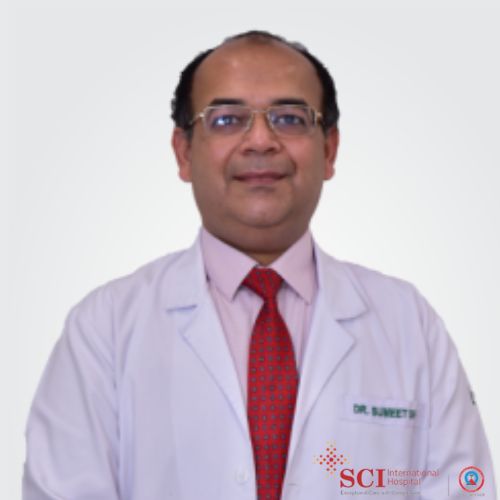Anal fissures are small tears in the skin around the anus that can cause pain, bleeding, and discomfort. They’re often caused by constipation, hard stools, or straining during bowel movements. At SCI Hospitals in Delhi, patients receive expert care from leading doctors who specialize in treating anal fissures using advanced methods like laser therapy and minimally invasive surgery. With a focus on comfort, quick recovery, and personalized treatment, SCI Hospitals is a trusted choice for fissure care in Delhi.
We Are Rated
Consult Now
An anal fissure is a small cut or tear in the skin around the anus. It can happen when you pass hard stools or strain during a bowel movement. This small tear can cause a lot of pain and may bleed.
It's important to treat anal fissures right away to avoid problems like long-term pain, infection, or a chronic fissure that's hard to heal. If left untreated, fissures can cause ongoing discomfort and might even require more complicated treatments later on.
Doctors diagnose anal fissures by asking about your symptoms and looking at the area carefully. Sometimes, they may use a small instrument called an anoscope to see inside the anus for better diagnosis.
If you wait too long without treatment, the fissure can become chronic or deeper. This will cause more pain and make treatment harder. Early treatment can help you heal faster and avoid surgery.
Non-Surgical Treatment Options
Most anal fissures can heal with simple treatments. These include:
Medications and Anal Fissure Creams
Doctors in Delhi often prescribe special creams to help heal fissures. These creams relax the muscles and increase blood flow to the area. Common medicines include:
These creams reduce pain and help the fissure heal faster.
Laser treatment is a modern, safe, and painless option available in Delhi. It helps remove the damaged tissue and promotes quick healing. The laser causes less pain and reduces the chance of infection. Many patients in Delhi prefer laser treatment because it has a fast recovery time.
If the fissure does not heal with medicines or laser treatment, surgery may be needed. Surgery usually involves a small cut in the muscle to reduce pressure and allow healing. This operation is done by expert surgeons in Delhi and has a high success rate.
SCI Hospitals has some of the best fissure doctors in Delhi. These surgeons specialize in proctology, which is the study and treatment of diseases in the rectum and anus.
The doctors at SCI Hospitals have many years of experience and have successfully treated thousands of patients in Delhi with anal fissures.
Many patients from Delhi have shared positive feedback about their treatment at SCI Hospitals. They say the doctors are kind and the treatment helped them feel better fast.

MBBS, MS - General Surgery, MBBS, MS - General Surgery, DNB - General Surgery
Understanding how each treatment is administered can help patients prepare and manage their expectations. Non-surgical treatments are often the first line of approach for managing anal fissures. These include: For fissures that do not respond to non-surgical treatments, minimally invasive procedures may be considered. These include: Surgical options are considered for chronic fissures that do not respond to other treatments. These include:Non-Surgical Treatments
Minimally Invasive Procedures
Surgical Treatments
SCI Hospitals make it easy to book your appointment. You can book online through their website or call the hospital directly to schedule your visit.
During your first visit, the doctor will ask about your symptoms and examine you carefully. They may suggest tests or treatments based on your condition. The doctor will explain everything clearly and answer your questions.
Anal fissures, though painful, are manageable with proper care and lifestyle adjustments. Understanding the causes and symptoms can aid in effective prevention and treatment. By following the recommended post-treatment care and long-term prevention strategies, individuals can minimise discomfort and prevent recurrence. Consulting with a healthcare provider ensures that the chosen treatment approach is tailored to individual needs, promoting a faster and more effective recovery.
Gastroenterologists or colorectal surgeons typically treat anal fissures. For expert consultation and treatment, consider visiting SCI Hospital.
Nitroglycerin ointments and calcium channel blockers are commonly recommended. Consult a healthcare provider at SCI Hospital for personalised advice.
Treatment varies but often includes dietary changes, topical treatments, and, if needed, surgical intervention. Consult with a specialist at SCI Hospital to determine the best approach for your condition.
Yes, most acute fissures heal with conservative treatments. However, chronic fissures may require surgical intervention. Discuss your options with a healthcare provider at SCI Hospital.
Recovery typically takes a few weeks, with most patients experiencing relief shortly after the procedure. Follow-up care at SCI Hospital can help ensure a smooth recovery.
Many insurance plans cover treatment, but coverage can vary. Check with your insurance provider and consult with SCI Hospital for more information.
Stool softeners and pain relievers are commonly used. Consult a healthcare provider at SCI Hospital for specific medication recommendations.
Combining a high-fibre diet with topical treatments can expedite healing. Consult with a specialist at SCI Hospital for personalised guidance on managing and treating anal fissures.
Consult Now
